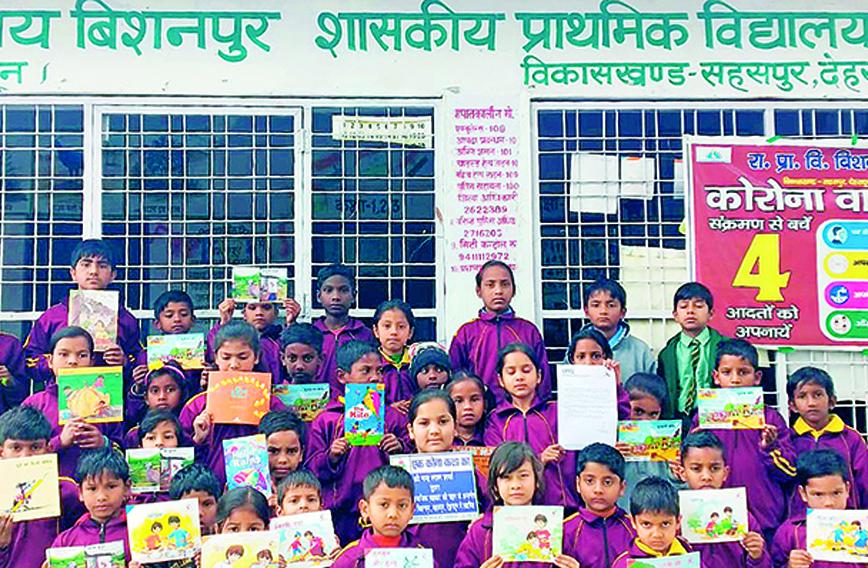
Children with books at a primary school at Bishanpur in Dehradun
Classroom corner libraries: Fun with books
Rakesh Agrawal, Dehradun
SMALL stacks of books in classroom corners in government schools in Uttarakhand are delighting children and winning the hearts of ordinary citizens.
Named Kona Kaksha Ka (Classroom Corner), the project is an initiative by Dhad, an NGO in Dehradun. “We started our mission in 2019 to improve access to reading in government schools. Anyone can, by contributing just `1,200 a year, set up a library corner in a primary school or an upper primary school or a secondary government school. Students can use the books during their spare time,” says Asha Dobhal of Dhad.
Dipika Rana, a sub-inspector with the state police, has donated for one such corner library in Government Inter College, Senior School in Ajabpurkalan, Dehradun district. Her contribution includes easy-to-read books on crime enforcement. “ I thought such books will help students become good citizens, follow traffic rules, honour the law and refrain from violence,” she says.
Tulsi, a student of Class 10, picked up a story book about cops catching a veteran thief. “I want to join the police so I chose this book,” she explains. Her friend, Chahat, opted for a slim book on traditional hill homes in Uttarakhand. “I want to become an engineer and build my own home,” she says.
People who want to set up a library corner can join this mission by sending the name, address, block and district of the school they wish to support with their contribution.
Around 724 such corners have been set up in all 13 districts of Uttarakhand. Dobhal says they are planning to add sports equipment, but this addition hasn’t taken off as yet.
Library corners generally stock copies of Champak, a fortnightly magazine for children, comics, an assortment of story books, drawing material, copies of a general knowledge magazine, and an edition of Rapidex English Speaking Course to help children learn the language. There are also books on social sciences, maths and science.
“Dhad underlines the importance of public education. It is the very foundation of learning and helps align ordinary people with school education,” says Ganesh Uniyal, coordinator, Kona Kaksha Ka.
“We want to develop a reading culture among children, extend to them the opportunity of learning various subjects, build their capacity of thinking and understanding and motivate them to practise good behaviour,” says Tanmay Mamgain, secretary of Dhad.
People donate for many reasons. Subodh Kumar Kala of the Indian Forest Service contributed for a books corner in Government Inter College, Kotwar in Pauri Garhwal district in memory of his late maternal grandfather.
Beena Mittal, a teacher, set up a library corner in Girls Inter College (Senior Secondary School), Ghamandpur, Pauri Garhwal district, where she had taught for 25 years on October 11 which is International Day for the Girl Child. She says she’s given books that emphasize gender equality.
The corner library movement has spread to 80 schools in the Kumaon region as well. In Almora district, the Government Primary School at Bajela village has a stash of more than 100 books in Classes 4 and 5.
Teachers say there is keen interest among children to learn English. By placing story books in English, the mission is improving their language skills, a noticeable achievement.
“My students in Class 5 love to read story books in English,” says Sannu Negi, assistant teacher, Government Girls Junior High School, Sidoli village, Chamoli district.
Dhad’s literary unit also organizes storytelling events. “We read out stories to children and begin a discussion on the book. Children share their vision of the country and the world with us,” says Kalpana Bahuguna, who is part of Dhad’s literary unit. They invite poets and singers in the state to join them and recite poems or sing for the children.
At an event organized by Dhad at the Government Inter College in Kishanpur, Lakshmi Prasad Badoni, a local poet, recited verses, Dr Neelam Prabha Varma retold stories from the Panchatantra and folk singer Poonam Naithani sang Garhwali folk songs.
Dhad also promotes local festivals and the folk ethos of the state. Children’s Festival or Baal Parv is celebrated; so are Phool Dei, a festival in the harvesting season, and Harela which honours Uttarakhand’s ecology.
Often, children return to their villages to celebrate such events with their families. During Phool Dei they collect flowers and bring them to their elders. During Harela, which means Day of Green, they plant saplings around their homes.
“Celebrating festivals encourages people to embrace eco-friendly choices, afforestation, and the protection of natural resources. It acts as a powerful platform to raise awareness about the impact of deforestation, climate change, and the need to safeguard the region’s rich flora and fauna,” says Mamgain.
The success of the Kona Kaksha Ka mission has inspired Dhad to establish Khel Konas and equip schools with cricket bats, balls, shuttlecocks, carrom boards, football and hockey sticks. “As Nelson Mandela said, sports ignite hope instead of frustration and can change the world. We believe it can unite students of different faiths, classes, castes and gender,” says Mamgain.
In Dehradun city, Dhad had selected 20 middle, 10 secondary, and 10 basic and primary government schools in 2018. However, the programme got mired in bureaucratic wrangles. “But we’re keen to start as soon as possible,” says Dobhal.
Comments
Currently there are no Comments. Be first to write a comment!



